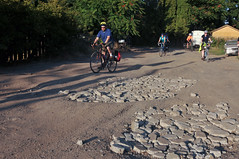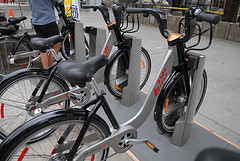This Wednesday at City Council, the Portland Bureau of Transportation (PBOT) will make their pitch for four projects they want to fund with $9 million in federal Regional Flexible Funds. As per instructions from Metro (the agency that doles out the money), three of the four projects — $6.6 out of $9 million total available — are active transportation projects.
“Without private support we wouldn’t be here today.”
— PBOT’s Dan Bower on private sector enthusiasm for bike share
Not surprising to close readers of this site, PBOT has chosen Portland Bike Share as one of those three projects.
In addition to $2 million in seed money to start a bike share system (which they say will leverage another $2 million in private funding to aid start-up, with ongoing operations paid for through memberships and user fees), PBOT will ask Council to approve a request for $3.36 million to improve bicycling and walking in East Portland and $1.25 million for “safety enhancements” to SE Foster Road. (The fourth request is for a $2.36 million freight project in St. Johns.)

greenway that would pave and improve
an east-west route from
NE 130th to I-205.
The East Portland Active Transportation to Transit project will include new sidewalks and buffered bike lanes on SE Division Street, crossing improvements at 12 intersections, funding for two neighborhood greenways (one north-south on the 130’s and east-west on Pacific-Oregon-Holladay), a shared-use path on the north side of SE Holgate, and bike parking at Holgate and Division MAX stations.
The Foster Road Safety Enhancements project would improve bicycling and walking crossings of Foster at three difficult intersections — at Foster and Holgate between SE 63rd to 67th, at 72nd Avenue, and between SE 80th and 84th.
These three active transportation projects were chosen from a short-list of five projects. The two that didn’t make the cut were the SW Barbur Streetscape Plan and the Sullivan’s Gulch Trail.
I met with PBOT Planning Manager Paul Smith, Acting Transportation Options Division Manager Dan Bower, and Traffic Safety Specialist Mark Lear today to discuss the decisions.
PBOT Planner Smith said, while they wish they could fund everything, Barbur and Sullivan’s Gulch weren’t on the list because planning processes are still ongoing for both projects. Barbur is the subject of a high capacity transit corridor planning study and plans for Sullivan’s Gulch are also currently underway. In the case of Barbur, Smith said, “We don’t even know what the final cross-section [roadway alignment] will be.”
For those disappointed that SW Barbur won’t get the federal largesse (especially after a collision on the street that killed Angela Burke back in December), Smith said PBOT has already met with the Oregon Department of Transportation to identify elements of the Streetscape Plan that might be compatible with the current planning project in order to make sure they are at the top of the list when improvements finally take place.
Overall, “The City feels good about this proposal,” Lear said today.
“We have some projects where we’re building a network — like the East Portland project — in parts of town that have a lot of disadvantaged populations that we think will be well-served with the sidewalks and bike facilities. In addition, we have an investment in Foster, primarily focused on safer crossings of Foster; and the bike share project, which we think really creates a new travel option for a huge portion of Portlanders.”
While the East Portland projects will be welcomed by many, the big news is the $2 million request for bike share. That money would be the crucial seed funding to get the project rolling. Once those funds are secured — and, barring objections from City Council, it’s likely they will be — PBOT says they’ve got another $2 million in private funds lined up (health care company Regence Blue Cross/Blue Shield has already committed to being a title sponsor).
Bike share is new for Portland, and in these times of meager City budgets, the project already has detractors (The Oregonian reports that Commission Amanda Fritz will vote against it).
“While we are confident the bike share project will have an immediate impact in the Central City, we want to test some sites further out to figure out what might work in those type of locations.”
— Mark Lear, PBOT
PBOT says the bike share system will focus on the Central City (on both sides of the river, similar to the new streetcar loop) because successful examples from other cities have shown that high density and urban land-use patterns are key. In addition, PBOT is expected to announce later today that the money will fund pilot projects in locations away from the Central City such as Multnomah Village, Hillsdale, and North Interstate near Killingsworth (along TriMet’s Yellow MAX line).
“While we are confident the bike share project will have an immediate impact in the Central City,” Lear said today, “we want to test some sites further out to figure out what might work in those type of locations.”
It’s likely that PBOT is doing those pilot projects in part to thwart criticism that bike share isn’t necessary in the Central City, a place that some feel is already transit and bicycle-friendly compared to many other parts of the city. During a public meeting in June to garner feedback on their Flexible Fund project list, bike share was the only project to receive negative comments.
But PBOT is bullish on bike-sharing. They’ve been studying it for several years and feel they have learned lessons from systems across the country. “It creates a new travel option for a huge portion of Portlanders,” PBOT’s Bower said today. Bower also touted the “unprecedented” private support for the project including a new letter of support from the Portland Business Alliance.
Of the four projects on PBOT’s funding list, bike sharing is the only one that doesn’t rely on any City money.
Mark Lear says he believes bike share would also come with a traffic safety boost for all road users. In addition to what he calls more “mixed users” (people who use more than one type of mode) Lear says another “huge factor” that will improve safety are all the people who will hop on one of the rental bikes and, “get a perspective of what it’s like to be a cyclist that they would never have gotten otherwise.”
Lear made it clear today that, while they won’t require helmets, PBOT wants to make their bike share program “one of the strongest” for encouraging helmet use. They plan to include helmets in all their marketing images and include information at rental kiosks on where to buy them.”
If PBOT projects are adopted by City Council Wednesday, they’ll be handed over to Metro on August 29th. Metro will hold a public comment period from September 9th to October 10th and then the Joint Policy Advisory Committee on Transportation (JPACT) will adopt the final list on December 8th, 2011.
While the federal funds wouldn’t become available until 2014, PBOT says they could start moving forward with plans as soon as next year following final adoption of the project list.
Stay tuned for more coverage. To learn more about bike sharing in Portland, read BikePortland’s extensive archives on the topic.


